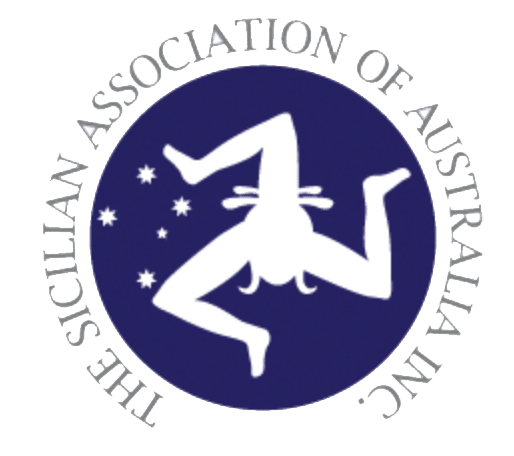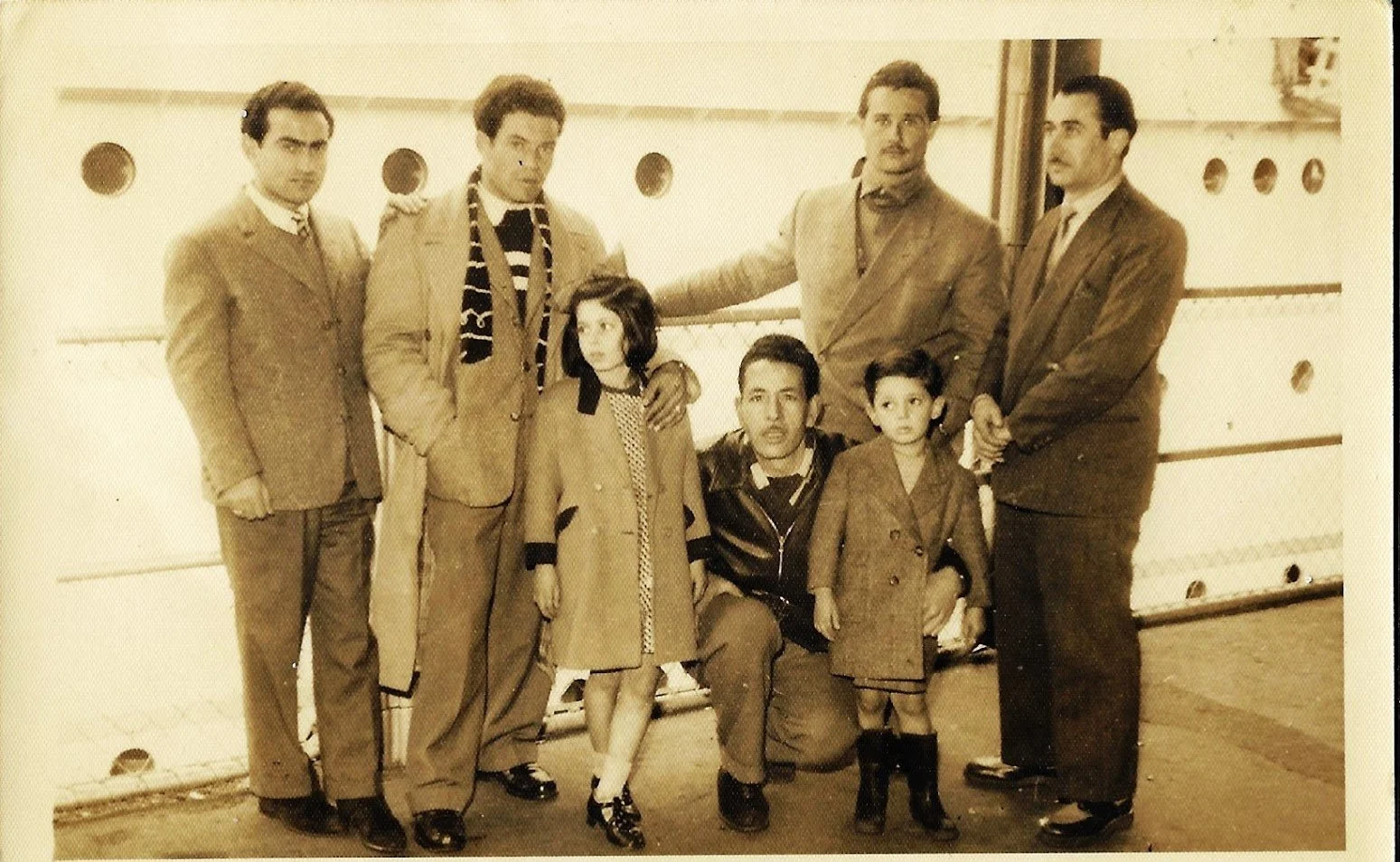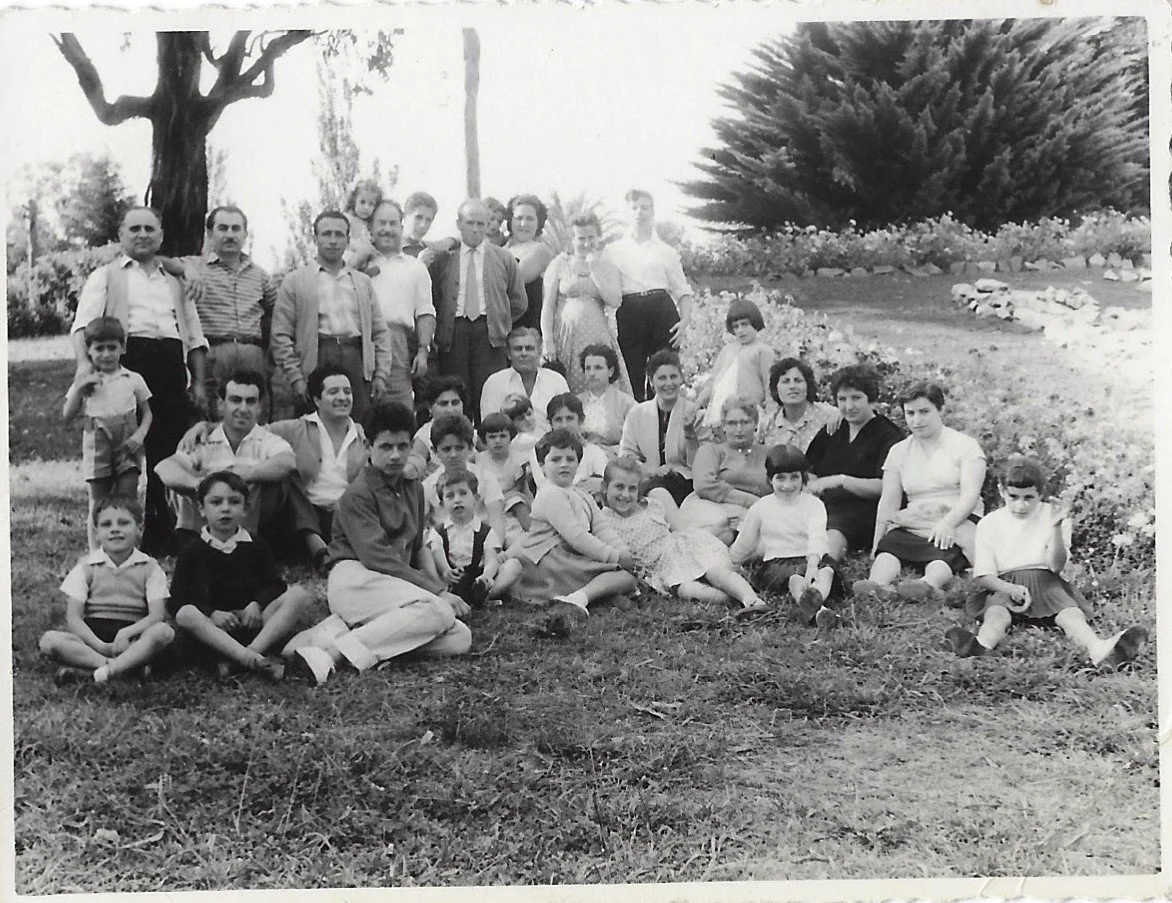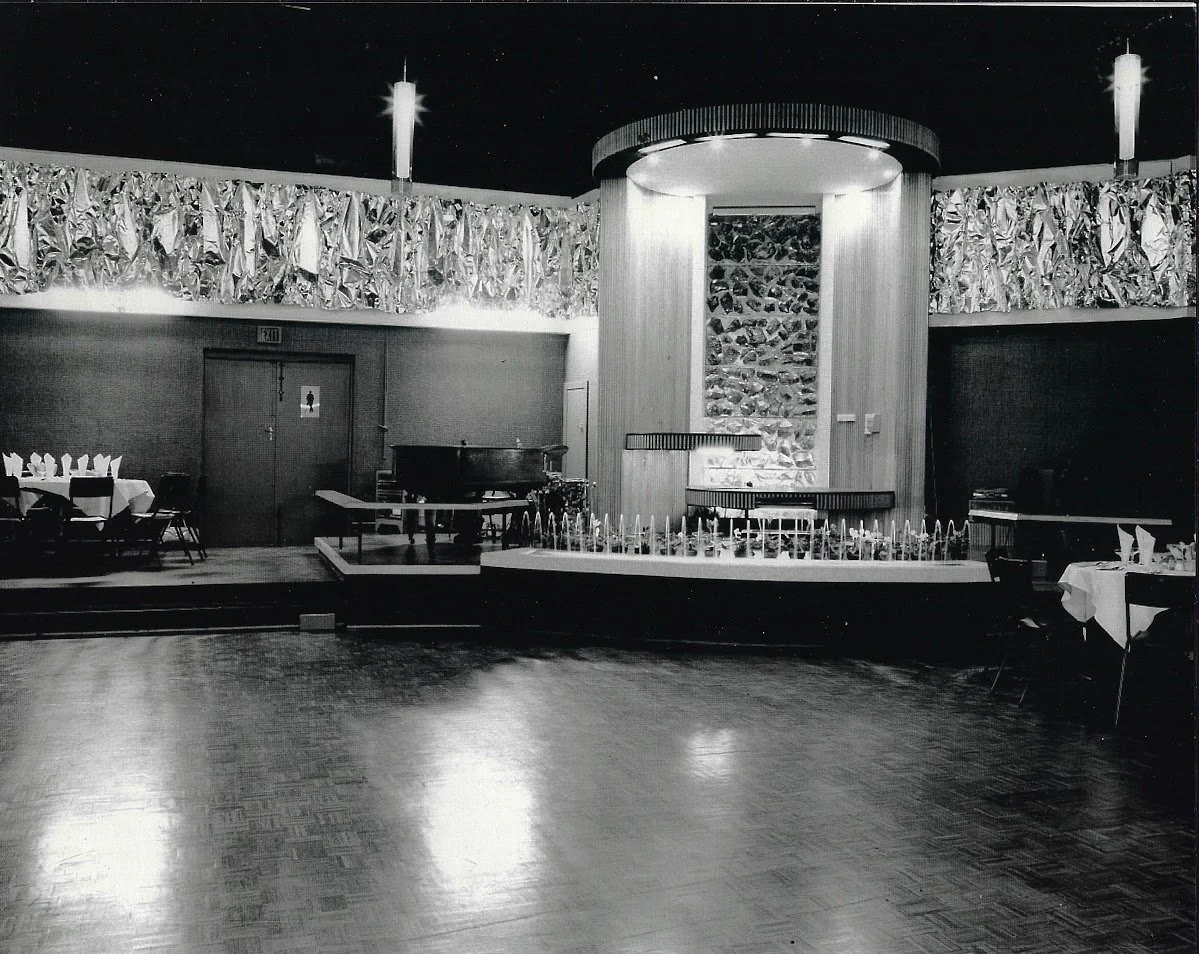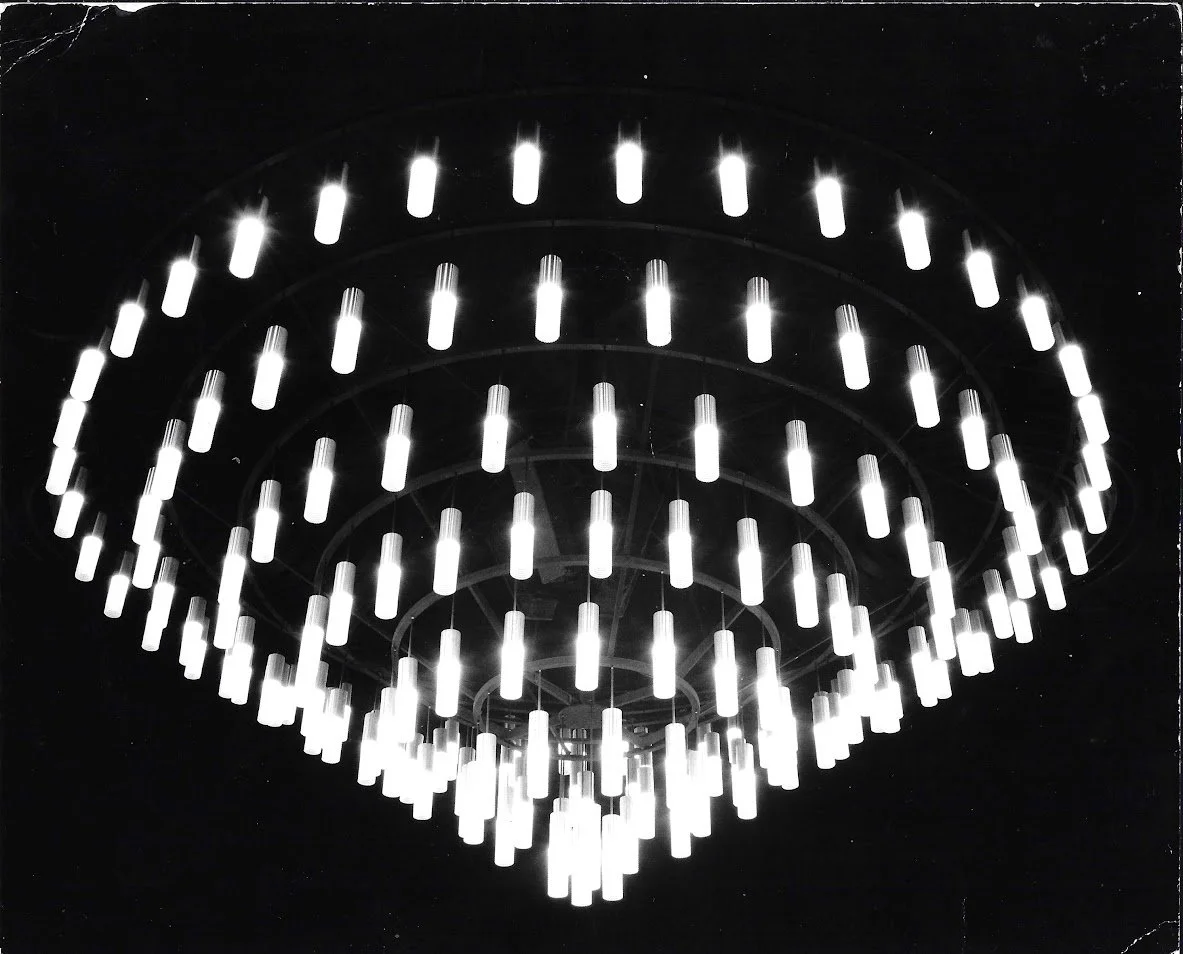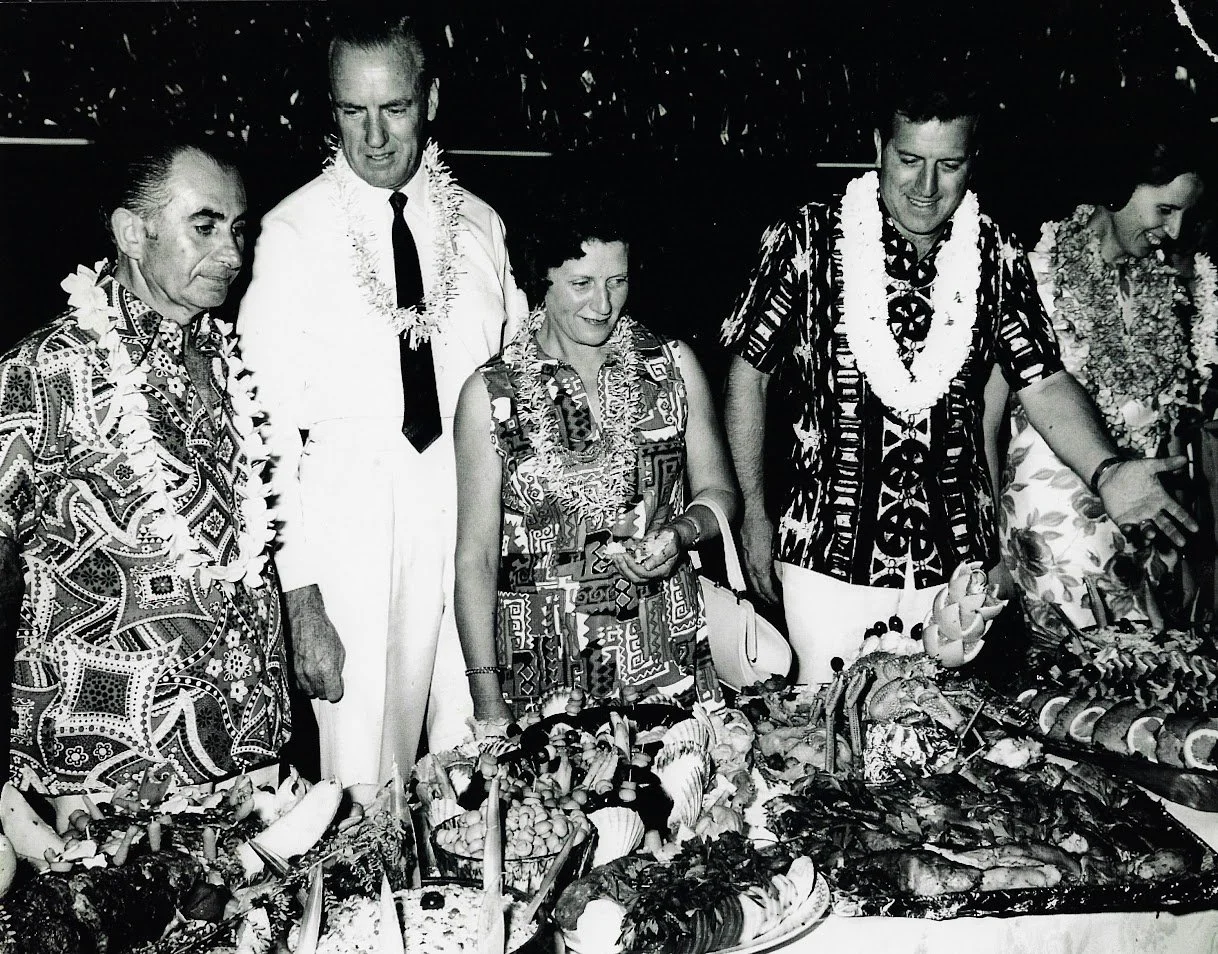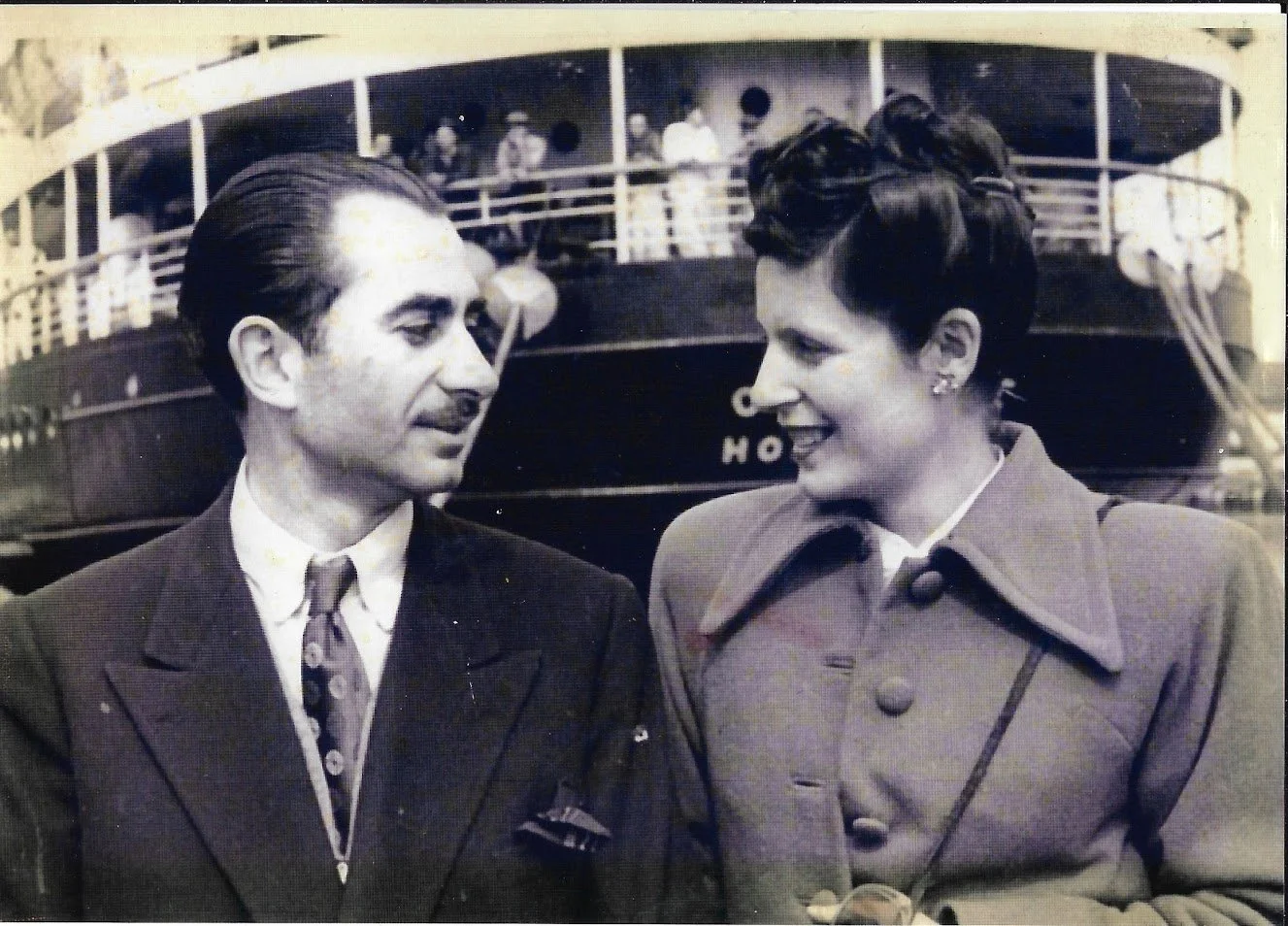
Carmelo and Giuseppina Vitale
‘Do good and forget about it, do the wrong thing and think about it.’
‘Carmelo and Giuseppina Vitale’. Photograph by unknown.
My parents Carmelo and Giuseppina Vitale originated from Ragusa Sicily. My father was born in 1915. My mother was born as Giuseppina Brugaletta in 1924.
My father was a soldier during the 2nd World War having served in Tobruk Africa. He had trained as a tailor in Milan, and worked there for some time. On his return to Ragusa he met and married my mother and opened his own tailoring business. His business was very successful and he employed about 4 workers.
He had absolutely no need to emigrate as he was doing very well. He made uniforms for the finanza. However let me say that there were long standing issues between his mother and his wife “Pina”, until one day he caught his mother in the act, and on the spot, he decided enough is enough!
He immediately sent a telegram to my mother’s brother Vincenzo in Melbourne, to please send ASAP, documents needed for his family to emigrate to Australia.
My uncle had emigrated to Australia as a 17 year old together with a cousin in 1927. Later another brother and a sister with her husband, and daughter all before the war.
‘Migrants Here From Italy’ (23 November 1948), The Sun News-Pictorial.
We arrived in Melbourne in 1948. I was 3 years and 10 months old, and Giuseppe, 3 months old.
We came by air on A.N.A Skymaster, the trip having taken 5 days. We left from Rome, first stop Cairo, Bombay, Singapore, Darwin then finally Melbourne. The plane would only travel by day, and we were put up in hotels at night for a short while.
We were greeted at the airport by our relatives and the “Sun newspaper”! Our relatives lived in North and West Melbourne very close to Victoria Market, and we lived with Mum’s sister opposite the market.
Within four weeks of our arrival they helped my father rent a shop and dwelling at only a couple of blocks down the road.
Dad quickly was able to set up his tailoring business, and we lived at the back.
We were the fortunate migrants! We had family to help us settle in.
Our relatives had many Italian friends, and they soon became our friends.
After we left Ragusa, my mother’s parents Salvatrice and Emmanuele Brugaletta, together with mum’s sister and her husband and baby daughter arrived in Melbourne one year later. Also mum’s cousin and her family on the same ship.
‘Carmelo and Giuseppina Vitale’. Photograph by unknown.
‘Vitale Port Melbourne with family’. Photograph by unknown.
This move seemed to trigger interest in many of our paesani in Ragusa who knew us. “Well if the Vitale’s and Brugaletta’s went to Australia, why not us?”
Within a short while my father was sponsoring some of his friends and about four of his ex workers from the tailoring ship in Ragusa. Helping them as we had been helped! Dad had the signage on the shop “Sartoria Italiana” and his tailoring certificate in Italian in the window.
The ships at that time were coming in to Port Melbourne, and also to Victoria Dock (now Docklands). These poor people, mainly single men, had no help and nobody to greet them. The ones that made it to Victoria Street, upon seeing an Italian shop would come in seeking help and advice.
After work dad would take me with him and that person and we would go door knocking asking for rooms to let. Me being the interpreter, I was probably five or six years old.
There were two or three boarding houses run by Italians. They were always at capacity. Dad would say the conditions were so cramped and they would change exorbitantly. There was a large building on Victoria Street and it was referred to as “The Hundred Rooms” and some would find accommodation there. Behind our shop was a pickle factory names “Epicure” and the owner would ask my dad to send anyone looking for work to him.
At that time there was a shortage of young Australian men as so many had been killed during the war. An Italian travel agency had opened a few shops down from us.
‘Vitale Family Picnic’. Photograph by unknown.
My dad had managed to have a telephone installed in our shop. It was not easy in those days to have a telephone, as your application for some reason took forever. The agent desperately needed one to run his business.
There was at the time a system called “Party Line” where two premises could share a telephone, though if one party was in use, the other couldn’t use it. Inevitably it was the agent that was always using it, until eventually dad said enough!! And we got our telephone back.
Some of the earlier arrivals now wanted to bring out from Italy family members. They would go to the travel agent who helped them with their applications. However you needed a sponsor! As my father had his own business, the travel agent would ask him to please sign the papers for these people. He signed many many applications, not knowing these individuals. Thankfully, there were no computers in those days and dad was never caught out. He stupidly went guarantor for some. Dad was always willing to help!
He was paid back KARMA. Dad did not know these people, but they know who he was that helped. When in time they needed a suit or later on a wedding to be catered for, they would give him their business saying “how can we forget what you have done for us?”. Dads motto was “Do good and forget about it, do the wrong thing and think about it”. Needless to say he was very well respected by many.
People would go to him looking for a solicitor for whatever reason, but they couldn’t speak English. Down the street was a solicitor. Of course dad couldn’t speak English, so then again he would take me along to interpret. The solicitor even offered to give me a job when I left school!!!
There were many occasions where my parents went far and beyond in welcoming and helping people that earned my family much respect in the community.
Dad was a tailor, but he had many ideas about what was needed in Australia for the Italian community. Unfortunately the English language was a barrier, for him.
A few doors down from our shop was an aussie cake shop run by an elderly couple. I remember the lady had one arm that finished at the elbow, and I was always amazed at how skilled she was at serving customers and wrapping cakes with one hand.
They were retiring, so dad got the idea to buy the business and turn it into an Italian cake shop. My mum had never worked in Australia, she had worked in a government office in Ragusa before being married, and had no experience in this work. Mum went in with the Walkers for one month and learnt how to keep the shop running until dad found an Italian pastrycook. Dad figured there were ships arriving from Italy every month, and sooner or later he would find someone. He found a Sicilian pastrycook and he worked for a while, but in the end dad had to get rid of him. We had moved to the dwelling above the cake shop as it was much larger, but mum was finding it very difficult with three young children and the hard work of the shop. My sister I think was only about two years old at the time.
A close friend of my fathers from Ragusa had worked in a bar in Ragusa (coffee shop). In Italy the bars made and sold cakes, cannoli etc., and he knew how to make a few pastries. He kept pestering my dad to sell him the shop because he could see the potential. My dad refused, saying I will close it down until I find the right person. The man then went to my grandfather asking him to convince dad to sell, saying can’t you see that your daughter is having a hard time.
Finally dad relented and sold the shop to him. This would have been about 1954-1955 very reluctantly dad sold, but said to his friend “This was my idea, and when I find the correct person I will open a shop, and I don’t care if it is next door to you, so be warned.”
As it turned out the man had married, and within months his wife worked day and night, and made a lot of money quickly. He closed the shop and went overseas on a holiday for six months. During this time the word was out that Mr. Vitale was looking for a pastrycook. A certain Luigi Tammaro was boarding in a house of Victoria Street directly opposite the tailoring shop. Luigi was about to return to Italy because he had not found what he wanted in Australia. The landlady directed him to my dad across the road and he introduced himself to my dad.
They had never met before! After having discussions and laying down some rules they became business partners. Luigi had no money, but dad agreed to finance the venture and Luigi could pay him back as the business went forward. He made one stipulation – Luigi was a single man and dad wisely said and agreed with him that should he one day marry, no wife of his would come into the business. The partners were Carmelo and Pina Vitale, and Luigi Tammaro. Dad reasoning that men could work together and resolve their differences, but two women would not. Very wise!!!
I should have mentioned that a small shop directly next door to my father’s tailoring premises was vacant and up for rent, so this became the Pasticceria.
The previous baker came back from Italy and sold his business to another person, and returned to live in Italy.
My dad always the entrepreneur decided that we should start a catering business for Italian weddings etc., and with the help of some people started San Remo catering.
The business took off brilliantly, and we were soon catering for large weddings at various town halls and around Melbourne, then Shepparton, Swan Hill, Cobram and even Canberra.
‘Sartoria Vitale’. Photograph by unknown.
An acquaintance of my father, a potato merchant had just built a warehouse in Capel Street West Melbourne, and approached my dad if he was willing to lease the upstairs and use it as a reception hall. Hence the San Remo Hall was opened circa 1960. This venue was always booked out, and we still catered around Melbourne etc. having up to 10 functions in the one day.
My mother Pina was at front of the shop and dealt with customers, also Luigi. He made certain that the functions ran smoothly etc. Pina organised the staff and did the ordering of food etc. Dad helped out where he could, whilst still working in the tailoring shop. We organised everything for these clients. We booked churches, venues, taxis, photographers and invitations for them at no charge. Today this is called “Wedding Planning” and is a lucrative business! We did this all for nothing, only charged for the food at the reception. That was the way it was! Even though I was at school, I would help in the shop and running errands paying deposits at the halls, and filling bombonieri. My younger brother Joe would work on the Saturdays helping out washing dishes etc. at the functions.
Mum was fantastic! She would personally call the waiters and casual kitchen staff when we knew the numbers of guests and book them to go to different venues. No computers all in her head. This goes here that goes there. Amazing. She was very well respected by all staff and clients.
In 1962, Tony, Luigi’s younger brother came out from Italy. With the help of Luigi they opened “Avola” Confectionary in a factory at the back of the Pasticceria. They were making confetti (sugar almonds) and torrone – nougat.
Unfortunately the sales were not great, as both these products were too early for the Australian market. (if only we had the factory now).
In February 1964 I became engaged to Tony and we were married in 1966. My father always the visionary, decided that he wanted to buy a picture theatre, reasoning that they were even large premises that could be converted into a ballroom or function venue.
Luigi had gone overseas on an extended holiday to San Remo Italy, leaving his brother Tony in charge of his affairs.
My father had always been interested in acquiring the shops that we rented on Victoria Street. They were owned by a dear gentlemen who lived in Kew. The gentleman always used to say “Mr. Vitale, I am not ready to sell, but when I am the shops are yours.” As fate would have it dad had just bought the Adelphi Theatre in Nicholson Street North Carlton when the gentleman approached us needing to offload the shops for whatever his reasons. He did not need money up front and was happy to sell on terms i.e. paying the property off with the actual rent covering the repayments.
It was decided between my parents that my dad would allow Tony to buy the shops for Luigi. On his return from Italy Luigi found himself the owner of a beautiful property which his wife now owns.
The Adelphi was still operating as a theatre, and it was decided that settlement would be held on the Saturday night after the last film was shown at the actual Theatre (very unusual, not in a solicitor’s officer).
The cinema staff were naturally upset at losing their jobs, and asked what we were going to do with the premises. We told them of our plans, and they said what a pity because foreign films had just started taking off, and would we consider continuing until all the construction permits came in.
I was nineteen at the time, my brother Joe was 15, dad couldn’t speak English well, neither my fiancé Tony. With their help it was up to me to run the theatre. The projectionist said don’t worry I will help you. So with his help from one week till the next, I was running a cinema.
He taught me how to go to Paramount pictures etc. and rent the movies for a fee etc. We would show two movies per night. The Italians loved Elvis Presley and Jerry Lewis, and then there would be a movie in Italian.
‘San Remo Ballroom’. Photograph by unknown.
‘San Remo Ballroom’. Photograph by unknown.
‘San Remo Ballroom’. Photograph by unknown.
‘San Remo Ballroom’. Photograph by unknown.
‘San Remo Ballroom’. Photograph by unknown.
‘San Remo Ballroom’. Photograph by unknown.
This worked well for a while, then my father got the idea that we should buy a movie called The “Processo di Verona” to do with the Mussolini era which was very fresh in the Italians mind after the war.
Tony went to Italy and contacted the studios of Dino de Laurentis who had produced the film. We bought the rights and with great success showed the film around Australia, and all was well. We used to rent the Italian movies from World Film distributors.
He saw how well we were doing with the Adelphi, so he bought a cinema in Queens Parade Clifton Hill calling it “Cinema Italia” as he was the distributor he started by withholding the films from us, showing them first. Attendances at the Adelphi started to go down. My father decided to go ahead with his original plan, and so San Remo Ballroom was born.
The ballroom opened with a grand reception in July 1967 with all the Elite from the Italian community present the architect was Erminio Smrekar, and the builders were Santilli and Primavera.
Many weddings and fantastic functions were held there. The Sunday night dance was always sold out. Men had to dress in suit and tie and ladies appropriately.
It was the place to see and be seen. Many, many Italians met their future spouses at the Sunday night dance, and held their wedding reception there.
The San Remo ballroom was and still is an icon. My parents and Luigi Tammaro decided to retire in 1986 when the building was sold.
I forgot to mention that there was a large area upstairs from the ballroom which my father allowed a group of artists to use free of charge as an artists studio, and many of our Italian painters used and met there to paint including for a while Charles Billich famous Australian artist, who literally took over the studio.
My father unfortunately died of cancer in December 1986.
He was a very generous, honest man who always was a little ahead of his time. In the very early days of the Pasticceria he suggested we make savoiardi and sell them to Myers which we did. Us children packing them in cellophane bags after school.
He said we should make chocolate Easter Eggs which we did. Because we didn’t yet have the moulds Luigi made the first egg using the plate from weight scales, then forming an egg. We eventually had moulds sent out from Italy and wholesaled the eggs to Italian shops and then to the supermarket chains.
Of course we were copied in what we did in all aspects of the business, but we were the trailblazers, and proud of it.
‘San Remo Ballroom’. Photograph by unknown.
‘First Hawaiian Night, Edda Smrekar and Pina Vitale’. Photograph by unknown.
‘Hawaiian Night San Remo Ballroom’. Photograph by unknown.
‘Carmelo and Giuseppina Vitale’. Photograph by unknown.
